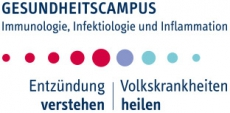Immunology incl. Molecular Medicine of Inflammation
Immunological research and molecular inflammation medicine have a long tradition at UMMD. The goal is to explore the importance of the immune system in the prevention and treatment of disease. Basic immunological research focuses on identifying molecules and signaling pathways that trigger and maintain protective or damaging immune responses. The transfer of findings from this basic research to clinical applications has led to medical breakthroughs in recent years. Outstanding examples are the new immunotherapies (checkpoint inhibitors, CAR-T cells, immunobiologicals) which are used with enormous success in a variety of diseases (e.g. cancer and autoimmune diseases).
Acute and chronic inflammatory reactions are also causally involved in many other common diseases. This also and in particular applies to chronic diseases, which can occur especially in an aging society. Therefore, the focus on inflammation is centrally integrated into the state program "Autonomy in old age".
The activities of the immunological focus are combined in the "Health Campus Immunology, Infectiology and Inflammation" (GC-I³). The work of the GC-I³ is carried out under the leitmotif "Understanding inflammation - curing common diseases".
Supporting pillars of immunlogical research are also::
- the DFG-Sonderforschungsbereich 854 "Molecular Organization of Cellular Communication in the Immune System", which also has its own research training group (MGK 854) i s included,
- the Else Kröner-Forschungskolleg Magdeburg "the importance of the inflammatory microenvironment for cancer development", in which young physicians are trained as clinician scientists,
- the DFG-Graduiertenkolleg 2408 "Maladaptive processes at physiological interfaces in chronic diseases" and
- the ERC Starting Grant "Dissecting the interplay between the dynamics of immune responses and pathogen proliferation in vivo(ImmProDynamics)".
The immunology focus and GC-I3 are integral parts of the university research center CHaMP (Center for Health and Medical Prevention) and maintains close relationships with the three other research centers at OVGU (Forschungszentrum Dynamische Systeme - CDS, Center for Behavioral Brain Sciences- CBBS und Center for Advanced Medical Engineering - CAME).









